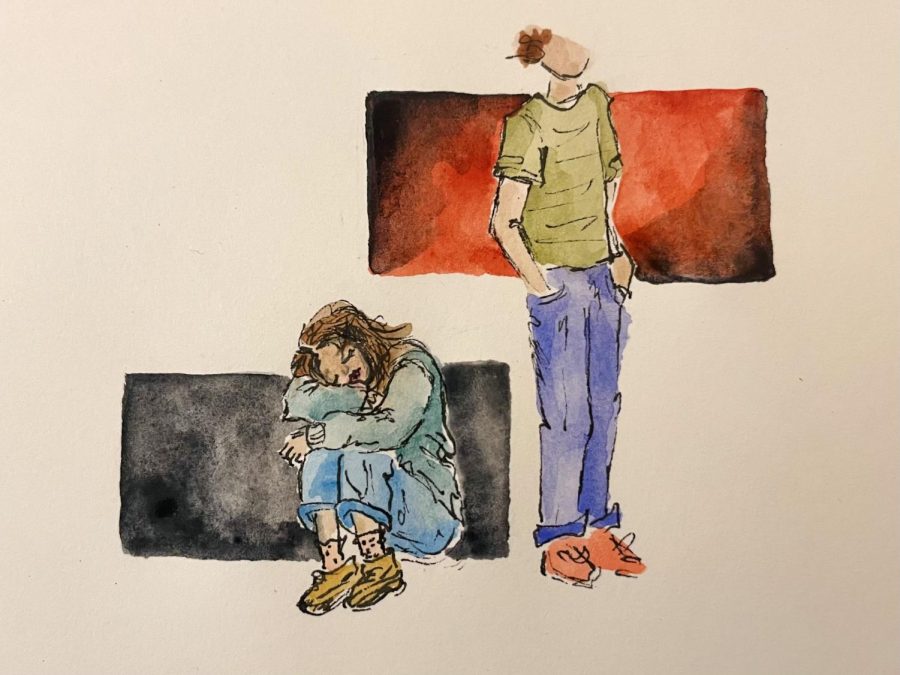We need more TV shows that don’t romanticize toxic teen relationships
October 13, 2022
I was 17 years old when it hit me that I had tried to grow up too fast.
I spent my first two years of high school chasing toxic friendships and romantic relationships that thrived on drama. I had a particular image in my mind: a screaming match, tears and a romantic make-up scene. Now I know why.
In the spring of my senior year of high school, I sat down to watch a show called “Heartstopper,” an LGBTQ+ romance and coming-of-age story.
People were talking about the new Netflix show all over social media, gushing over how cute it was, so I figured, why not give it a try? Little did I know, I’d be sobbing by the third episode.
At first, I could not understand what about the show was making me so emotional—so I watched it again.
I was so obsessed with the story and characters because I realized the depiction of teens in the show is how 15- and 16-year-olds are supposed to be acting. They are supposed to be awkward. They are supposed to strive for happy, healthy relationships.
I felt like it was too late for me to ever have a relationship like that. I wished so badly for a redo of those formative years I had spent looking for toxicity.
It isn’t my fault that I had wanted toxic relationships, though. It’s what I had been taught to want by watching the shows so many other young teens watch, like “Gossip Girl,” “Vampire Diaries” and “Riverdale.”
Many of these toxic teen dramas depict characters that are supposed to be high schoolers, yet freely engage in risky behaviors like drinking and sex, as if they are adults.
It’s not uncommon for characters to have deceased or absent parents, not as a way to explore grief or family struggles but to give the teen characters more freedom to act like adults.
Take Elena from “Vampire Diaries,” for example. The show begins after her parents die, and her guardian dies shortly after in season 2. This gives Elena and her brother free rein of their house, living alone as though they are adults and not high schoolers.
Teens do experience trauma, and this should be represented in the media, but never as a ploy to further a romance or add drama to a plot.
Around 11 million women and five million men in the United States have reported experiencing teen dating violence, according to the Centers for Disease Control and Prevention. Intimate partner violence, which includes psychological and physical abuse, can be prevented by encouraging healthy, respectful and nonviolent relationships.
This starts with the media teens are exposed to. About two-thirds of all TV shows contain violence, and this violence is often glamorized, according to the American Academy of Pediatrics.
Glamorizing violence causes teens to become desensitized to it, ultimately making it more difficult for them to recognize violence in their own lives, according to a January 2016 study from National Library of Medicine.
Violence in the media, especially when depicted in the form of a character that is relatable to teens, turns it into a social norm off-screen.
If a teenager’s favorite on-screen relationship involves not communicating or going through a cycle of hurting, fighting and making up, it paints a false image of what a relationship should be like.
One study found that teens will typically watch shows involving characters with whom they identify, according to a March 2016 study from the University of Pennsylvania. Teens with marginalized identities, in particular, may have a harder time finding non-toxic shows that have characters they can relate to.
This especially applies to the LGBTQ+ community, where so many shows and other media depicting queer characters solely focus on the characters’ struggle to find community. It reduces the lives of LBGTQ+ characters to a search for acceptance.
This is one reason “Heartstopper” stood out to me so much.
Charlie Spring, the main protagonist, struggles with relationships and seemingly unattainable crushes, just like any teen would. While he does face homophobia, he has a supportive community of friends, teachers and family who encourage him towards healthy relationships.
Spring’s life is not merely reduced to a search for acceptance.
I’d like to see more content like this moving forward.
Toxic relationships are not romantic. Let’s stop pretending they are.
